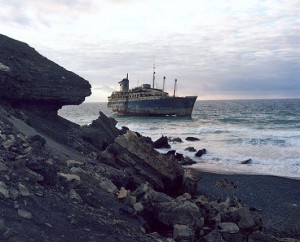 A recent post by Andy Davies over at the Antipode Foundation’s blog raises some interesting geographical questions, particularly around labor, in light of the recent Costa Concordia shipwreck. On this blog we’ve noted some of the tricky problems the sea presents for modern spatial-political phenomena such as the law, sovereignty, states, territory, power, and cosmopolitanisms. As Davies notes, there’s the work by Marcus Rediker and Peter Linebaugh that highlights the class-based cosmopolitanism produced by various proletarians of the sea—particularly pirates. (Davies surveys some of the other emerging literature on “Salty Geographies.”) Pirates, of course, also constitute, according to Daniel Heller-Rozen, the first “universal enemy,” a genealogical lineage that extends to contemporary “terrorist” tropes. The seashore has also long been a complicated legal space straddling the aquatic and the terrestrial, an issue examined at some length by Carl Schmitt’s Nomos. The material liminality of the coast was a strategic aspect exploited by the shipwreck harvesters known as “wreckers” in 18th Century England discussed by John Rule. It’s nice to see that the geographically minded are taking greater interest in analyzing the sea, which has as much to tell us about the politics of ocean spaces as it does about terrestrial politics.
A recent post by Andy Davies over at the Antipode Foundation’s blog raises some interesting geographical questions, particularly around labor, in light of the recent Costa Concordia shipwreck. On this blog we’ve noted some of the tricky problems the sea presents for modern spatial-political phenomena such as the law, sovereignty, states, territory, power, and cosmopolitanisms. As Davies notes, there’s the work by Marcus Rediker and Peter Linebaugh that highlights the class-based cosmopolitanism produced by various proletarians of the sea—particularly pirates. (Davies surveys some of the other emerging literature on “Salty Geographies.”) Pirates, of course, also constitute, according to Daniel Heller-Rozen, the first “universal enemy,” a genealogical lineage that extends to contemporary “terrorist” tropes. The seashore has also long been a complicated legal space straddling the aquatic and the terrestrial, an issue examined at some length by Carl Schmitt’s Nomos. The material liminality of the coast was a strategic aspect exploited by the shipwreck harvesters known as “wreckers” in 18th Century England discussed by John Rule. It’s nice to see that the geographically minded are taking greater interest in analyzing the sea, which has as much to tell us about the politics of ocean spaces as it does about terrestrial politics.
-
Recent Posts
Categories
- #Occupy
- Agriculture
- Antonio Gramsci
- Art
- Assemblages
- Bandits
- Boundaries
- Carl Schmitt
- City
- Critique
- David Harvey
- Development
- Dialectics
- Drugs
- Elites
- Everyday Life
- Forests
- Frontiers
- Gender
- Governmentality
- Guy Debord
- GWF Hegel
- Hegemony
- Henri Lefebvre
- Historical Materialism
- Historical-Geographies
- Illegality
- Insurgency/Counterinsurgency
- Interweb Motley
- Jester
- Karl Marx
- Land
- Law
- Maps
- Marxism
- Max Weber
- Media
- Michel Foucault
- Nation/Nationalism
- Networks
- Niccolo Machiavelli
- Peace
- Pirates
- Place
- Political Ecology
- Political Economy
- Post-Colonial
- Power
- Primitive Accumulation
- Race & Ethnicity
- Raymond Williams
- Scale
- Science & Tech.
- Security
- Sovereignty
- Spatiality
- Spectacle
- Territory
- Terror
- The Body
- The Sea
- The State
- Uncategorized
- Violence
- Work Hack
Archives
- February 2020
- September 2013
- August 2013
- June 2013
- May 2013
- April 2013
- March 2013
- February 2013
- January 2013
- December 2012
- November 2012
- October 2012
- September 2012
- August 2012
- June 2012
- May 2012
- April 2012
- March 2012
- February 2012
- January 2012
- December 2011
- November 2011
- October 2011
- September 2011
- August 2011
- July 2011
- June 2011
- May 2011
- April 2011
- March 2011
- February 2011
Fellow Tricksters
- Acme
- Antipode
- Cartographies of the Absolute
- Critical Legal Thinking
- Danger Room
- Decolonizing Solidarity
- Fragments & Correspondence
- Geographical Imaginations
- Gerard Toal
- Human Geography
- Monthly Review
- Mute
- New Left Review
- Open Geography
- Path to the Possible
- Peoples Geography
- Philosophy in a Time of Error
- Place Hacking
- Pop Theory
- Posthegemony
- Progressive Geographies
- Public Political Ecology Lab
- Radical Cartography
- Social Design Notes
- Society & Space
- Space and Politics
- Spatially Inclined
- Strange Maps
- Street Art Utopia
- The Disorder Of Things
- The Geography Collective
- Trevor Paglen
- Visual Complexity
